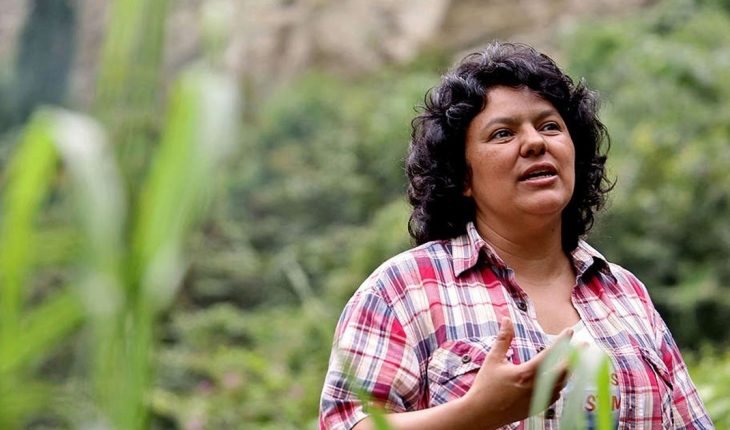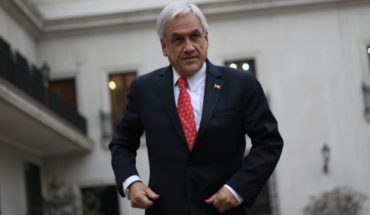Today marks five years since the murder of Berta Cáceres, the indigenous activist Lenca, feminist and one of the best-known human rights defenders in Honduras, who gave her life to the defense of the territory, the environment and the rights of the Lenca people.From the Civic Council of Popular Indigenous Organizations (COPINH), which co-founded in 1993, organized permanent campaigns against mega projects that violated environmental rights and harmed or nullified the development worthy of local communities. Cáceres fought for the defense of forests and rivers, the autonomy of indigenous peoples and resisted – always in community – the coup d’etion of 28 June 2009, a milestone in Honduran history that brought greater impunity and a resurbing in violence, mainly towards women and indigenous peoples. It even received the Goldman Environmental Award in 2015, aimed at defesorxes of nature and the environment.
“From the rivers we are ancestral custodians the Lenca people, also sheltered by the spirits of the girls who teach us that to give life in multiple ways for the defense of rivers is to give life for the good of humanity and this planet,” the Honduran activist said when she collected the Goldman Prize.
Thus he faced multinational corporations, illegal loggers, plantation owners and the construction of hydroelectric dams, among others. For her struggle she received dozens of death threats, which she denounced for years and was eventually led to precautionary measures by the Inter-American Commission on Human Rights (IACHR) since 2009, albeit without state protection. In addition, her mother and children had to leave the country, while she slept every night in a different place, practically did not communicate over the phone and left public presentations, as protection. In fact, a week before her murder, Cáceres reported that she and other leaders in her community had received death threats and four others had been killed. For the crime committed between the night of March 2 and the early morning of March 3, 2016, the Honduran court convicted seven people on 29 November 2018 and acquitted another. Among those convicted were the three hitmen who fired on Cáceres, two ex-military personnel and two workers linked to the company DESA (Energy Developments), which sought to build a hydroelectric dam to which the activist fervently opposed it. In response to this resolution, the Cáceres family criticized the ruling and opined that “there were convictions but there was no justice,” his daughter explained, as the owners of the hydroelectric plant were not investigated. In this regard, organizations such as CEJIL (Centre for Justice and International Law) and Amnesty International consider that “the intellectual perpetrators of the murder are still in impunity”. In addition, from COPINH they broadcast on Tuesday a pronouncement in memory of the environmentalist asking for justice. “Pressure from economic and political groups prevents progress with justice and Daniel Atala Midence, José Eduardo Atala Zablah, Pedro Atala Zablah and Jacobo Atala Zablah from being brought to justice to answer for their crimes,” they argued.
Berta Cáceres’ activism aimed to dismantle racism, classism and patriarchy.
Honduras is the most dangerous country in the world for environmental activism, with a total of twelve environmental activists killed in 2014 and more than 120 between 2010 and 2017 for opposing dam projects, according to research by the NGO Global Witness.Currently, according to the report Territories at Risk II of Intermón Oxfam, in this country operate 112 hydroelectric plants and there are 300 more in projection that are in different phases of planning and implementation , 25 of them are within protected areas and another 34 are in Lenca territory. In this line, last January, the Honduran Government approved the construction and operation of 14 more dams. Berta and feminismThe wrestler Berta Cáceres activated from different causes, finding the intersection between all of them. His struggles were set to make visible and work against racism, capitalism and patriarchy. Andrea Gigena, a CONICET researcher specializing in citizenship and political participation of indigenous women, warned, in dialogue with Filo.news, that The feminist thoughts of Cáceres were advanced for their time and that they did not get the recognition deserved.” The history of feminism in the Latin American region, thinking about it in the 1980s, the ’90s, always had a great difficulty getting involved, vinculrecognize other identities beyond the female subject. And it has always been said that she had some distances with popular women,” Gigena introduced, “In this context, “Berta, she added, makes clear the vindication of feminism and struggles for the emancipation of women, along with other struggles: those of her own community as a collective, as an indigenous people. That was quite graphic of that relationship (feminism and indigenism) that now seems very fluid, but that even in 2010 were not so obvious.” In fact, Berta Cáceres supported her struggle on three pillars. In an interview in 2010 with the writer and feminist activist of Italian and Mexican nationality, Francesca Gargallo, Cáceres noted: “If all the elements of triple domination, racist, patriarchal and classist are not took into account, then we will repeat again the story of domination that we want to dismantle”.
Berta Cáceres.
“We cannot separate racism on the one hand and postpone patriarchy, say that justice for women comes after ‘X’ power triumphs,” she added, and specified, “I believe that in the case of indigenous women it is a greater challenge than that of urban women because all conditions of injustice, discrimination and racism add up.” In addition, he focused on the importance of the relationship between the woman and her body. Regarding the militarization of Honduras after the coup that overthrew Manuel Zelaya, Cáceres stated that “if women do not talk about their bodies to each other, if they do not recognize their rights to pleasure and not to suffer violence, they will not be able to understand that militarization is a practice of territorial invasion that is linked to violence against women , by using sexual rape as an instrument of war.” There is a tendency not to mention Berta Cáceres as part of indigenous feministry, possibly because her environmental activism was more resonant,” explained fellow Social Sciences Andrea Gigena. “But she was a forward in those approaches and in that recognition in dialogue with feminists,” she concluded. The struggle of Cáceres remains firm to this day in his family, in organizations such as COPINH and in the struggles of indigenous peoples and communities. Ninari Chimba Santillán, an activist of Kichwa nationality, from two indigenous peoples of Ecuador, Panzaleo and Otavalo, left a message to this medium in honor of her memory: “Berta Cáceres, immortality in her voice and action. How important it remains despite the years, because throughout the Abya Yala now its legacy is watered, and it reaches us all, and joins us, with half-breeds, indigenous, black. It has reached half the world, Ecuador, and we will ensure that it continues to walk, as an antidote to oblivion, tranquility in the face of impunity, and the cold that distances us with Mother Earth. She, who keeps Berta alive in thousands of us when we sow, when we sing, when we weed, when we speak mother tongues, when we write, when we dance, when we defend and question, when we harvest and walk, when we are consistent with what we say and do. Berta lives to the navel of the world.” Finally, a phrase from the tireless fighter for the rights of indigenous peoples and women, Berta Cáceres: “Mother Earth, militarized, fenced, poisoned, where elementary rights are systematically violated, requires us to act.”
In this note:
Berta Cáceres
Honduras
Indigenous peoples
Feminism





